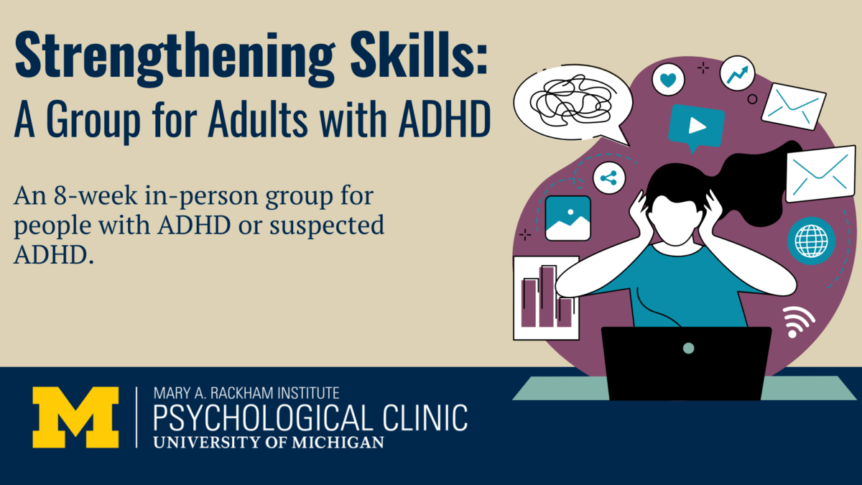The Mary A. Rackham Institute (MARI) Psychological Clinic at U-M is offering an Adult ADHD Skills Group that will provide a structured and supportive environment to help people learn and practice essential skills for managing ADHD-related challenges.
Specifically, the group will target difficulties like organization, prioritization, and time management, to help participants build useful structures into their day. The overall goal with the group is to give participants skills and tools to be more confident and successful in life’s various domains.
This therapy group will be held at the MARI Mental Health Office in Ann Arbor, runs for 8 weeks, and is set for 5:15-6:45 p.m. Tuesdays, beginning late-February or mid-March.
This is an in-person group held at the MARI office and participants are expected to commit to the full eight weeks. Referrals from other professionals are welcome and encouraged!
ADHD Group Details
- Who is this for: People who have been diagnosed or who suspect they have ADHD and/or who struggle with “executive” functioning like being consistent in organization, prioritizing actions, time management and time blindness, and other related challenges.
- When: 5:15-6:45 p.m. on Tuesdays, beginning late-February/mid-March, 90 minutes each week, for 8 weeks.
- Where: MARI Mental Health Offices at 210 S. 5th Ave. Ann Arbor, MI 48104.
- How to Register: Each participant must complete a 30-minute screening appointment to ensure the group is a good fit for their needs. Contact the MARI Call Center at (734) 615-7853 or complete our secure, online registration form to get started. Current MARI clients may not need to complete a screening.
- Cost: Each weekly session is billed at $45 per person for self pay. Some insurances are accepted. The screening is billed at $20.
What is ADHD and How Does it Affect Adults?
Attention Deficit Hyperactivity Disorder (ADHD) is a neurodevelopmental condition that affects individuals across the lifespan. Specifically in adulthood, ADHD can interfere with various aspects of daily functioning, including at work, in relationships, and in terms of overall well-being.
Why a group approach? Many people seek individual therapy for managing the challenges associated with ADHD. As research indicates though, ADHD is considered “comorbid,” meaning it often occurs along with other mental health concerns. This comorbidity can make managing emotional needs as well as implementing the practical, behavioral changes necessary in treating ADHD difficult to achieve in therapy.

